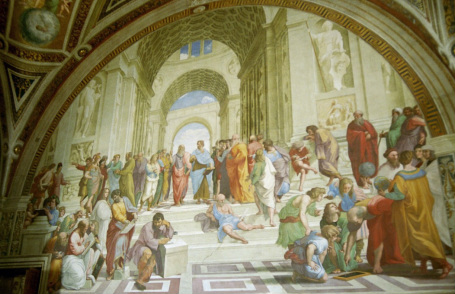~Lyceum Defined~
 School of Athens by Raphael (Vatican Museums)
School of Athens by Raphael (Vatican Museums)
Lyceums (lye-SEE-ums) began as places for community learning in ancient Greece. Learning was physical, political, and academic, and specific to the community. Plato and Socrates both taught in the Athenian Lyceum. Many countries in Europe and Asia call their secondary schools Lyceums or Lycées even today.
In America, during the Transcendental period lyceums were revived. Daniel Webster, Henry David Thoreau, and Ralph Waldo Emerson were members of lyceums in Massachusetts. Abraham Lincoln, Horace Greeley, and Mark Twain spoke at various lyceums. Thoreau's Civil Disobedience was first presented at a lyceum in Concord. The literary journal of Harvard was originally called The Lyceum.
Lyceums have been an environment for education and enlightenment--for youth AND adults. Family Lyceum is a forum for the education and enlightenment of families.
In America, during the Transcendental period lyceums were revived. Daniel Webster, Henry David Thoreau, and Ralph Waldo Emerson were members of lyceums in Massachusetts. Abraham Lincoln, Horace Greeley, and Mark Twain spoke at various lyceums. Thoreau's Civil Disobedience was first presented at a lyceum in Concord. The literary journal of Harvard was originally called The Lyceum.
Lyceums have been an environment for education and enlightenment--for youth AND adults. Family Lyceum is a forum for the education and enlightenment of families.
